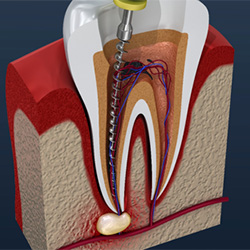Root Canal Therapy – Louisville, KY
Save Your Smile with a Root Canal
If you have a severely damaged or infected tooth, do not have it removed. Bell Dental can save it with root canal therapy in Louisville. Although they have a bad reputation for being painful, new advancements in dentistry make them no worse than a traditional filling. Using the latest methods, we will rehabilitate the health of your tooth to save your smile.
What is a Root Canal?

A root canal is an endodontic procedure that removes the inner most layer of your tooth, known as the pulp. Although the pulp is necessary while your tooth is still developing, it can survive without it after it is fully formed.
The procedure involves removing the areas of decay and damage prior to extracting the pulp through the crown. Your tooth is sterilized and sealed using a material called gutta-percha. Now that its health is restored, we improve its function and appearance by placing a custom-made crown over the tooth. It is crafted to meet your exact size, shape, and color needs to look and feel natural.
Why Do I Need a Root Canal?

When a tooth is compromised by decay or infection, the easy answer may appear to just have it pulled. While this provides a quick fix, it leads to new complications due to the missing tooth. To fill the empty space and to protect your oral health, you will need to make a lifelong commitment to a dental prosthetic, like a bridge.
Although it may be tempting to put your root canal on hold, it is never a good idea. The longer you wait, the more damage that will occur. If too much time passes, we may not be able to save your tooth.
How Does Decay Start?

Your teeth have 3 layers. The hard outer layer you see is the enamel, which protects the dentin. The dentin contains tiny tubes that connect to the inner layer known as the pulp. When you consume sugary foods and drinks, it combines with your saliva to create an acid. As it sits on your teeth, it eats away at your enamel until a small hole forms, known as a cavity. At this point, it can be treated with a filling; however, if you delay care, it will progress until it extends beyond the dentin to infect the pulp.
After the pulp is affected, it leads to many painful complications, which can only be stopped with a root canal.
How Do I Know If I Need a Root Canal?

There are some obvious signs you may need a root canal, such as:
- Pain.
- Tenderness when placing pressure on the tooth.
- Lingering sensitivity to hot or cold foods and drinks.
- Darkening of your tooth.
- A pimple-like bump appearing on the gum near the tooth.
Understanding the Cost of Root Canals

If you’re seeking root canal treatment, you likely want to know the estimated cost before scheduling anything. Rest assured – our dental team in Louisville will provide you with a detailed estimate and discuss available financing options to ease any concerns you may have. In the meantime, continue reading as we've outlined everything from cost-influencing factors to insights on dental insurance coverage below!
Factors That Can Affect Root Canal Cost

Root canal treatment varies for each patient, which is why we perform X-rays, conduct a comprehensive oral examination, and assess the extent of damage to offer an accurate cost estimate. After determining the tooth requiring treatment, evaluating the complexity of your case, and considering any additional services required (such as gum disease therapy), we can create your personalized treatment plan and provide you with a precise quote.
Is it Cheaper to Pull My Tooth?

When weighing the cost of root canal treatment against tooth extraction, the latter may initially appear more economical. However, this isn't typically the case. The cost of tooth extraction doesn't include the expense of the dental bridge or implant required to replace the missing tooth. Plus, preserving natural teeth whenever possible is essential for maintaining oral health, jawbone integrity, and overall well-being. That’s why tooth extractions are usually considered only when no alternative exists, and they often don't prove to be more cost-effective than root canal treatment.
Does Dental Insurance Cover Root Canals?

In most cases, yes! Many dental insurance plans partially cover the cost of necessary restorations to protect your treated tooth in the future. Additionally, if you visited us for an emergency exam, your benefits might extend to cover that as well.
However, your specific coverage ultimately depends on the details outlined in your dental plan. We strongly advise reviewing your plan to understand your benefits thoroughly. If you need assistance, please feel free to ask! We're pleased to accept a wide range of providers, including Delta Dental and Cigna.
Other Options for Making Root Canal Treatment Affordable

At Bell Dental, we offer multiple ways to save. If you don’t have dental insurance, you can apply for flexible financing through a reputable third-party financier like CareCredit. This allows you to divide the cost of root canal treatment into manageable monthly payments. We also have an in-house membership plan to make paying for your root canal much easier. For one low annual fee, you’ll be eligible for a significant discount on this service!
Root Canal FAQs

If you have been told that you need a root canal, you likely have some concerns that need to be addressed. Don’t worry; we’ve decided to soothe some of your worries by answering some of the most frequently asked questions about root canals. If you have a question that you don’t see answered somewhere on this page, just give us a call for more information.
Are Root Canals Painful?
Contrary to rumors you might have heard, root canal therapy shouldn’t hurt. The procedure is actually designed to relieve pain by removing the infected portion of your tooth. Thanks to the power of local anesthetic, you shouldn’t feel any discomfort during the treatment. You might feel slightly sore for a few days afterward, but applying a cold compress to the area and taking an over-the-counter pain medication as needed should be more than enough to alleviate it.
How Much Does a Root Canal Cost?
Whatever your root canal costs, keep in mind that extracting and replacing the tooth may cost several times that amount. Not to mention, you’d have to spend significantly more time in the dental chair. For this reason, your mouth and your wallet are both better off by getting a root canal now rather than an extraction later.
The good news is that most dental insurance plans will cover at least the partial cost of a root canal. Many insurance carriers consider root canal therapy a major restorative procedure, so they’ll often pay for about half the cost. You’ll have to check the details of your specific policy to determine how much coverage you’re eligible for. If you need help getting in touch with your insurance carrier, our team is always here to help.
How Long Does a Root Canal Take?
The overall length of the procedure varies depending mainly on what type of tooth is undergoing treatment. Generally, the farther back in the mouth you go, the more time is needed to complete a root canal. This is because molars (back teeth) have more root canals inside them that need to be cleaned out, so that can take longer. On average, a root canal will take about 90 minutes. At your consultation, we can give you a more personalized estimate of how long it will take.
If My Tooth Doesn’t Hurt, Why Do I Need a Root Canal?
Many patients experience severe tooth pain when an infection is present. This is the result of the infection reaching the pulp of your tooth, where the nerve is located. In some cases, however, the infection progresses to the point where the nerve is do damaged that it has essentially “died,” preventing it from sending pain signals to the brain. At this point, you’re going to need a root canal to keep the infection from spreading to other areas.
Save Your Smile Today!
If you have a damaged tooth, do not have it pulled. Bell Dental will save your smile. Contact our office today to schedule your consultation for a root canal.
